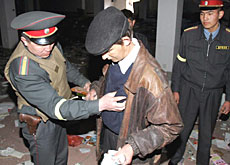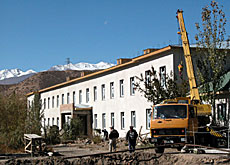Swiss appeal for stability in Kyrgyzstan

Switzerland says it hopes order can soon be restored in Kyrgyzstan, two days after street protests led to the ousting of President Askar Akayev.
The foreign ministry said it had no plans to repatriate Swiss nationals, but added that it was monitoring the situation closely.
A second night of unrest in the capital Bishkek saw at least three people killed. But correspondents said there was no repeat of the widespread looting on Thursday night after the opposition seized power.
The Swiss government condemned the acts of violence and urged the opposition and the authorities in Kyrgyzstan to start talks as soon as possible.
“Everything must be put in place to prevent violence from escalating and to resolve the fundamental electoral and political differences, while respecting civil and human rights,” said the Swiss foreign ministry.
The Central Asian country’s new leadership said on Saturday that it was taking steps to restore order.
“The situation is fully under control. We do not need a curfew,” said opposition leader Felix Kulov, who has been put in charge of security.
Projects suspended
The Swiss Agency for Development and Cooperation (SDC) said it had suspended projects in the south of the country and advised Swiss nationals – apart from those mediating between the authorities and the opposition – to remain at home.
The foreign ministry said it did not intend to repatriate Swiss nationals from the capital or from the south of the country.
Up to 60 Swiss live in Kyrgyzstan, with around a dozen working for the SDC, the State Secretariat for Economic Affairs (Seco) and non-governmental partners.
“There are no reasons to fear for their safety,” said the Swiss foreign ministry.
Officials said the Swiss embassy in Tashkent in neighbouring Uzbekistan and the SDC were monitoring the situation closely.
The SDC and Seco fund a number of projects in Kyrgyzstan to the tune of SFr19 million ($16 million) a year, focusing mainly on health, good governance and conflict prevention.
Kyrgyzstan falls into the “Helvetistan” group of nations, represented by Switzerland at the World Bank and International Monetary Fund.
Clashes
According to Kyrgyzstan’s interior ministry, five people died and around a hundred were injured when crowds clashed with police on Thursday and seized Bishkek’s White House, the seat of government. The protests followed disputed elections earlier this year.
President Akayev, who has accused the opposition of carrying out an “anti-constitutional coup”, is now in Russia.
Acting president Kurmanbek Bakiyev, who played a central role in the protests, has appointed an interim cabinet and promised new elections in June.
The Swiss-run International Committee of the Red Cross said staff had been able to visit hospitals in Bishkek where they saw around 60 injured, but none with gunshot wounds.
The ICRC, which has five personnel in Kyrgyzstan, said hospitals had all they needed to treat the wounded.
“The events of the past few days do not constitute a conflict situation,” said ICRC spokesman Vincent Lusser.
swissinfo with agencies
Kyrgyzstan is a mainly Muslim country with a population of around 5 million. It borders Kazakhstan, Uzbekistan, Tajikistan and China.
Both the United States and Russia have military bases outside the capital Bishkek. Both countries are vying for influence in energy-rich Kyrgyzstan.

In compliance with the JTI standards
More: SWI swissinfo.ch certified by the Journalism Trust Initiative


You can find an overview of ongoing debates with our journalists here . Please join us!
If you want to start a conversation about a topic raised in this article or want to report factual errors, email us at english@swissinfo.ch.